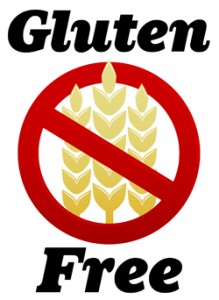 You may be hearing a lot about gluten these days and wondering what the fuss is about. There are gluten-free breads and other specialty products in stores, and you may have friends who follow gluten-free diets. Here are the facts about gluten and some information to help you decide if a gluten-free diet may be right for you.
You may be hearing a lot about gluten these days and wondering what the fuss is about. There are gluten-free breads and other specialty products in stores, and you may have friends who follow gluten-free diets. Here are the facts about gluten and some information to help you decide if a gluten-free diet may be right for you.
What is Gluten Anyway?
Gluten is a protein found in wheat, barley and rye. There is nothing inherently bad in gluten, but it does cause digestive problems, like bloating, gas, diarrhea and abdominal pain in some individuals. This is not an allergic reaction but sensitivity to the protein. In this case, it may be helpful to avoid gluten or even eliminate it from your diet altogether.
The important thing to note, however, is that gluten sensitivity does not cause long-term damage. If you eat gluten, you may have irritating symptoms, but it will not affect your overall health.
For about one percent of the population, intolerance to gluten can cause serious health consequences. These individuals suffer from celiac disease. When gluten reaches the small intestine, it can cause an abnormal immune reaction that damages the intestine and prevents celiac sufferers from absorbing the nutrients in food.
This lack of nourishment can eventually damage the brain, the peripheral nervous system, liver, bones and other organs. There is no cure for celiac disease, but people diagnosed with the condition can live healthy lives by completely removing gluten from their diets.
How to Be Gluten Free
It may sound simple at first—simply stop eating foods made with wheat, barley or rye. Unfortunately, going gluten-free requires a bit more work. “Gluten” is generally not labeled under the ingredients list in most foods made with grains. Aside from obvious foods like bread, pasta or crackers, gluten can hide in some unexpected places. Soups, gravies and sauces, salad dressings, candy, beer, imitation crab meat, pickles, chutneys, and processed lunch meat are likely to contain gluten.
Since celiac disease is being diagnosed more commonly than it was even a decade ago, there are a growing number of gluten-free products on store shelves. Not only must these foods not contain gluten, but they must be processed in facilities that are free of wheat or other gluten-containing foods in order to avoid contamination.
Celiac sufferers must be careful about any product that may touch their lips, whether it is a food or not. Lipsticks and lip balms, postage stamps, and toothpaste may contain gluten.
Going gluten free may sound nearly impossible, but it is not difficult once you learn the ropes. One important principle to remember is that the more “processed” a food is, the more likely it is to contain gluten.
If you follow guidelines for healthy eating and choose foods in their whole, most natural form, you have taken a big step toward gluten-free living. Fruits, vegetables, rice, legumes and most dairy products are safe to eat. Wine and distilled liquor is gluten-free. The same goes for unprocessed animal proteins, like beef, poultry and seafood.
For baking, you may use a variety of gluten free flours, like quinoa, rice, soy, corn and nut flours. The Celiac Disease Foundation provides resources and lists of foods and ingredients to watch out for at . To create the healthiest gluten-free diet, I recommend working with a dietician.
Should You Go Gluten Free?
If you suspect celiac disease, do not put yourself on a gluten-diet; instead, see your doctor. It is more difficult to make a correct diagnosis if gluten is not creating certain indicators in your blood. Symptoms vary, but they include abdominal pain, intermittent diarrhea, weight loss, general weakness, oily and foul-smelling stools, muscle cramps and joint pain. Celiac has traditionally been difficult to pin down, but more doctors today are knowledgeable about the disease. To make the diagnosis, your doctor will look for signs by doing a blood test. If those are present, a biopsy of the small intestine is needed for confirmation.
If you do not have celiac, it is still possible for you to have a difficult time digesting foods containing gluten. See if going gluten free improves your symptoms. Sometimes, simply eating a healthy diet of natural foods gives you more energy and vitality. With a little effort and knowledge, it is easy to enjoy a delicious, gluten-free diet full of foods you love to eat.
